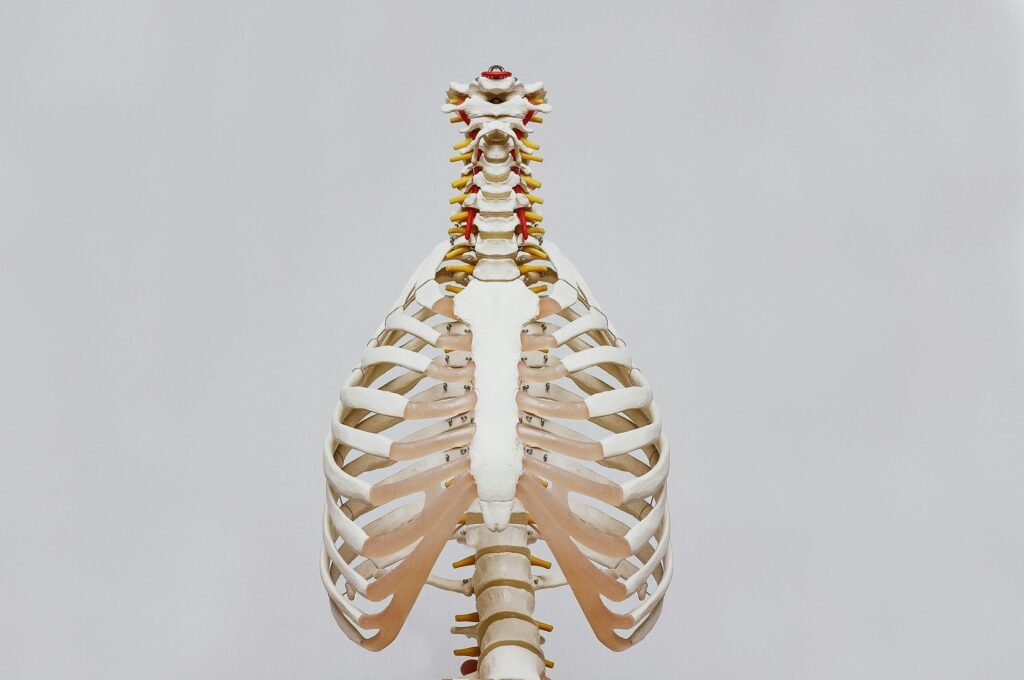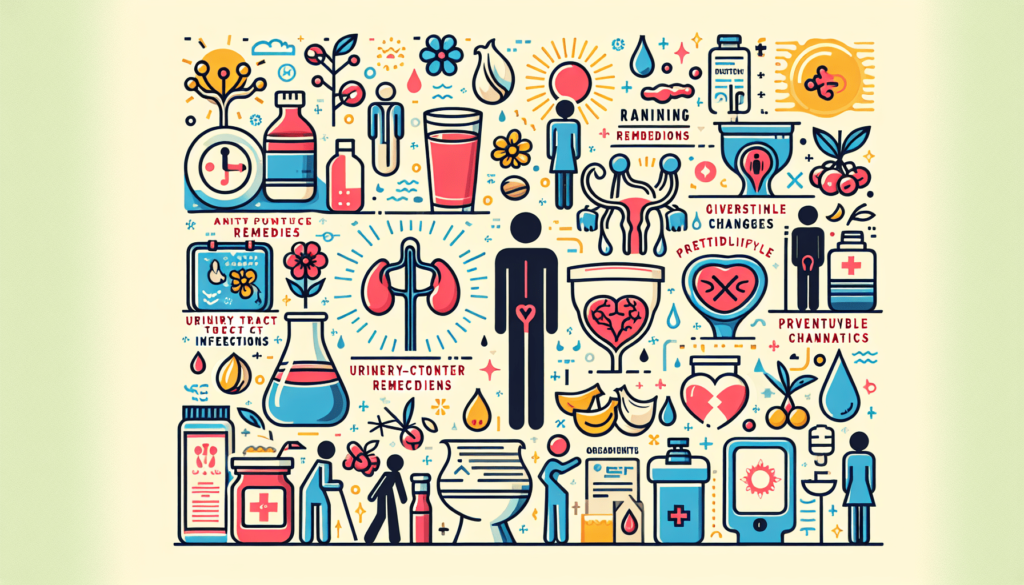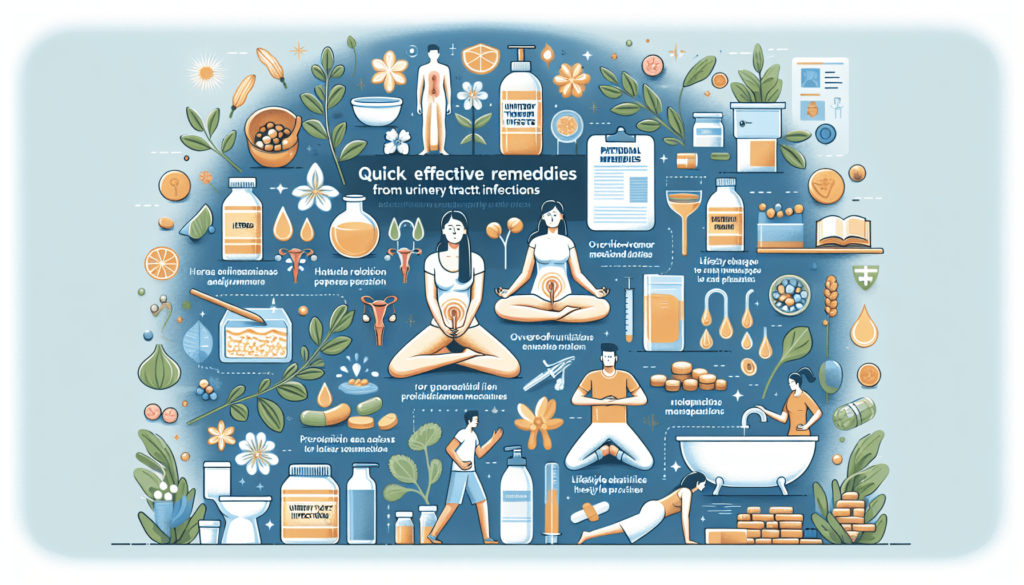If you’ve ever experienced the uncomfortable symptoms of a urinary tract infection (UTI), you know how important it is to find quick relief. From the frequent urge to urinate to the burning sensation, UTIs can disrupt your daily life and leave you longing for relief. But fear not! In this article, we will explore some effective UTI remedies that can provide you with the quick relief you need. So, sit back, relax, and discover the solutions that will help you get back to feeling like your vibrant self in no time.

Introduction to UTI
Defining UTI
A urinary tract infection (UTI) is a bacterial infection that occurs in the urinary system, which includes the kidneys, bladder, ureters, and urethra. It is a common condition that can affect people of all ages, but it is more prevalent in women. UTIs occur when bacteria enter the urinary tract through the urethra and multiply, leading to infection.
Causes of UTI
UTIs are typically caused by bacteria, most commonly Escherichia coli (E. coli), which is found in the gastrointestinal tract. Other bacteria, such as Staphylococcus saprophyticus or Klebsiella pneumoniae, can also cause UTIs, although less frequently. The bacteria can enter the urinary tract through various means, such as improper wiping after bowel movements, sexual intercourse, or the use of contaminated catheters or medical instruments.
Common Symptoms
The symptoms of a UTI can vary, but typically include a frequent and urgent need to urinate, a burning sensation during urination, cloudy or bloody urine, strong-smelling urine, and lower abdominal pain or discomfort. Some individuals may also experience fever, chills, and fatigue. It is important to recognize these symptoms and seek prompt medical attention if they occur, as untreated UTIs can lead to more severe complications.
Prevention of UTI
Drink plenty of water
One of the simplest and most effective ways to prevent UTIs is to drink plenty of water. Staying hydrated helps to flush out bacteria from the urinary tract and dilutes the urine, making it less likely for bacteria to grow and cause an infection. Aim to drink at least eight glasses of water per day, and more if you engage in activities that cause you to sweat or if you live in a hot climate.
Urinate frequently
Another important preventive measure is to urinate frequently. Holding in urine for prolonged periods of time can allow bacteria to multiply in the urinary tract, increasing the risk of infection. Make it a habit to urinate whenever you feel the need to go, and try not to resist the urge to urinate.
Wipe from front to back
Proper hygiene is crucial in preventing UTIs. When using the restroom, always remember to wipe from front to back after a bowel movement. This helps to prevent bacteria from the anal area from spreading to the urethra, reducing the risk of infection.
Avoid irritating feminine products
Certain feminine hygiene products, such as douches, powders, and deodorant sprays, can irritate the urethra and increase the risk of UTIs. It is best to avoid using these products and opt for gentle, unscented cleansers instead. Additionally, avoid using tampons or menstrual cups for longer than recommended, as they can also contribute to UTI development.
Empty the bladder before and after sexual activity
Urinating before and after sexual activity can help flush out any bacteria that may have entered the urethra during intercourse. This simple practice can decrease the risk of UTIs caused by sexual activity. Additionally, proper hygiene before and after sexual intercourse, such as washing the genital area, can also help prevent the spread of bacteria.
Over-the-counter Remedies
Antibacterial medications
Over-the-counter antibacterial medications, such as phenazopyridine, can provide relief from the uncomfortable symptoms of a UTI, such as pain, burning, and urgency to urinate. These medications work by numbing the urinary tract and can be taken along with prescribed antibiotics for maximum relief.
Urinary analgesics
Urinary analgesics, also known as urinary pain relievers, are available over-the-counter and can provide temporary relief from the pain and discomfort associated with a UTI. These medications work by soothing the irritated lining of the urinary tract, alleviating symptoms while waiting for the antibiotics to take effect.
Natural supplements
Certain natural supplements, such as D-mannose, are believed to help prevent and treat UTIs. D-mannose is a type of sugar that can attach to bacteria in the urinary tract, preventing them from sticking to the walls and causing an infection. While more research is needed to confirm its effectiveness, many individuals find relief from taking D-mannose supplements.
Cranberry products
Cranberry products, such as cranberry juice or cranberry capsules, have long been recommended for UTI prevention. Cranberries contain compounds that can prevent bacteria from adhering to the urinary tract walls, making it more difficult for them to cause an infection. However, it is important to note that cranberry products should not be used as a substitute for antibiotics in treating an active UTI but can be used as a preventive measure.
Home Remedies
Increase water intake
Drinking an adequate amount of water is not only important for prevention but also for managing UTI symptoms at home. Increasing your water intake can help dilute the urine and flush out the bacteria causing the infection. Aim to drink at least 8-10 glasses of water per day, or as recommended by your healthcare provider.
Take probiotics
Probiotics are live bacteria that promote a healthy balance of gut flora. Some studies suggest that taking probiotics, specifically lactobacilli, may help prevent UTIs by inhibiting the growth of harmful bacteria in the urinary tract. You can find probiotics in supplement form or naturally in certain foods, such as yogurt and kefir.
Drink unsweetened cranberry juice
While cranberry products are not a cure for UTIs, drinking unsweetened cranberry juice may help prevent them. Cranberry juice contains compounds that can prevent bacteria from adhering to the urinary tract walls, reducing the risk of infection. However, it is essential to choose unsweetened cranberry juice to avoid added sugars that can exacerbate UTI symptoms.
Apply heat to the lower abdomen
Applying a heating pad or hot water bottle to the lower abdomen can help relieve pain and discomfort caused by a UTI. The heat can help relax the muscles in the area, reduce inflammation, and provide a soothing sensation. However, it is important to use heat therapy at a comfortable temperature and avoid placing it directly on the skin to prevent burns.
Use a hot water bottle or heating pad
Using a hot water bottle or heating pad can also provide relief from UTI symptoms. The heat helps increase blood flow to the area, which can help reduce inflammation and alleviate pain. Wrap a hot water bottle or heating pad in a towel and apply it to the lower abdomen for 15-20 minutes at a time.

Medical Treatments
Prescription antibiotics
In cases where home remedies and over-the-counter treatments are not sufficient, medical treatment with prescription antibiotics is often necessary to eliminate the infection. Antibiotics work by killing the bacteria causing the UTI, and the specific medication and duration of treatment will depend on the severity of the infection and the type of bacteria involved. It is important to finish the full course of antibiotics as prescribed, even if symptoms improve, to prevent the infection from recurring.
Pain medications
In addition to antibiotics, pain medications can be prescribed to provide relief from the discomfort associated with a UTI. Nonsteroidal anti-inflammatory drugs (NSAIDs) such as ibuprofen or acetaminophen can help reduce pain and inflammation. However, it is important to consult with a healthcare professional to determine the appropriate dosage and duration of use.
Urinary tract analgesics
Urinary tract analgesics, such as phenazopyridine, can be prescribed to relieve the pain and burning associated with a UTI. These medications work by numbing the urinary tract, providing temporary relief while waiting for the antibiotics to take effect. It is essential to follow the prescribed dosage and limit the use of urinary tract analgesics as prolonged use can mask serious underlying conditions.
Alternative Therapies
Acupuncture
Acupuncture, an ancient Chinese practice, involves inserting thin needles into specific points in the body to promote the flow of energy. Some individuals find relief from UTI symptoms through acupuncture, as it is believed to improve circulation and stimulate the body’s natural healing processes. It is important to consult with a qualified acupuncturist to ensure safe and effective treatment.
Herbal remedies
Certain herbal remedies, such as uva ursi, goldenrod, and Oregon grape, have been traditionally used to treat UTIs. These herbs are believed to have antimicrobial properties and can help combat the bacteria causing the infection. However, it is crucial to consult with a healthcare professional before using herbal remedies, as they may interact with medications or have side effects.
Essential oils
Essential oils, such as tea tree oil and oregano oil, have antimicrobial properties and may help in managing UTI symptoms. However, it is important to use essential oils with caution and dilute them properly with a carrier oil before applying topically or using them in a bath. Some individuals may be sensitive to certain essential oils, so it is recommended to do a patch test before using them.
Hydrotherapy
Hydrotherapy, which involves the use of water for healing purposes, can provide relief from UTI symptoms. Soaking in a warm bath or using a sitz bath can help soothe the genital area and ease discomfort. Adding a few drops of essential oils, such as chamomile or lavender, to the bathwater can enhance the therapeutic benefits. However, it is important to ensure proper hygiene and avoid hot baths if you have an active infection.

Lifestyle Changes
Maintain good hygiene
Proper hygiene is essential in preventing and managing UTIs. Remember to wash the genital area gently with warm water and unscented cleansers. Avoid using harsh soaps or douches that can disrupt the natural balance of bacteria in the urinary tract.
Wear loose-fitting clothes
Tight-fitting clothes, especially synthetic materials, can trap moisture and create an environment conducive to bacterial growth. Opt for loose-fitting, breathable clothing, such as cotton, to allow proper air circulation and reduce the risk of UTIs.
Avoid irritants
Certain substances, such as spermicides, can irritate the urinary tract and increase the risk of UTIs. If you are prone to UTIs, consider avoiding these irritants and choosing alternative contraceptive methods, such as condoms or non-spermicidal lubricants.
Practice safe sexual habits
Engaging in safe sexual practices can help prevent UTIs caused by sexual activity. Use condoms to reduce the risk of bacterial transmission, and consider urinating before and after sexual intercourse to flush out any potential bacteria. It is important to communicate openly with your partner about sexual health and any concerns regarding UTIs.
Manage stress levels
Stress can weaken the immune system and make the body more vulnerable to infections, including UTIs. Practice stress management techniques, such as deep breathing exercises, meditation, or engaging in hobbies that bring you joy. Taking care of your mental and emotional well-being can support overall health and decrease the risk of UTIs.
When to Seek Medical Attention
Persistent or severe symptoms
If your UTI symptoms persist for more than a few days despite home remedies and over-the-counter treatments, it is important to seek medical attention. Similarly, if your symptoms are severe, such as intense pain, fever, or blood in the urine, it is essential to consult with a healthcare professional as soon as possible.
Recurrent UTIs
If you experience frequent UTIs, defined as having three or more infections within a year, it is advisable to seek medical evaluation. Recurrent UTIs may indicate underlying issues that need to be addressed, such as urinary tract abnormalities or weakened immune function. A healthcare provider can help identify the underlying cause and develop a treatment plan.
Complications
While UTIs are generally treatable and not life-threatening, complications can occur if the infection spreads to the kidneys or other parts of the urinary system. Signs of complications include severe pain in the back or side, high fever, nausea, vomiting, and confusion. If you experience any of these symptoms, it is crucial to seek immediate medical attention.

Tips for UTI Relief
Stay hydrated
Drinking plenty of water is essential for relieving UTI symptoms and preventing further infections. Hydration helps flush out bacteria from the urinary tract and dilutes the urine, reducing the concentration of bacteria. Aim to drink at least eight glasses of water per day, or as recommended by your healthcare provider.
Take pain relievers
Over-the-counter pain relievers, such as ibuprofen or acetaminophen, can help alleviate the discomfort associated with a UTI. These medications reduce inflammation and provide temporary relief from pain. However, it is important to follow the recommended dosage and consult with a healthcare professional if you have any underlying medical conditions or take other medications.
Avoid bladder irritants
Certain foods and drinks can irritate the bladder and worsen UTI symptoms. Avoid or limit the consumption of caffeine, alcohol, spicy foods, and acidic foods or beverages, such as citrus fruits and juices. Opt for bladder-friendly options, such as water, herbal teas, and mild, non-spicy foods, to ease discomfort.
Urinate when necessary
Listen to your body and urinate whenever you feel the urge. Holding in urine for extended periods can allow bacteria to multiply in the urinary tract, increasing the risk of infection. Make it a habit to respond promptly to your body’s signals and visit the restroom when necessary.
Practice good hygiene
Maintaining proper hygiene is crucial for UTI relief and prevention. Remember to wash the genital area gently with warm water and unscented cleansers. After using the restroom, always remember to wipe from front to back to prevent the spread of bacteria. Additionally, changing out of wet bathing suits or sweaty workout clothes promptly can help prevent bacteria growth.
Conclusion
Importance of early treatment
UTIs can cause significant discomfort and, if left untreated, can lead to more severe complications. Recognizing the symptoms and seeking prompt medical attention is essential for early treatment and prevention of complications. In addition to medical treatments, there are various over-the-counter remedies, home remedies, alternative therapies, and lifestyle changes that can provide relief and help prevent UTIs.
Combining remedies for maximum relief
It is important to note that while individual remedies may offer some relief, combining multiple approaches can maximize the effectiveness in managing UTIs. Talk to your healthcare provider about the most suitable remedies for your specific situation, as underlying health conditions, allergies, or interactions with medications need to be considered. By taking a comprehensive approach and adopting preventive measures, you can reduce the frequency and severity of UTIs, promoting better urinary tract health.



